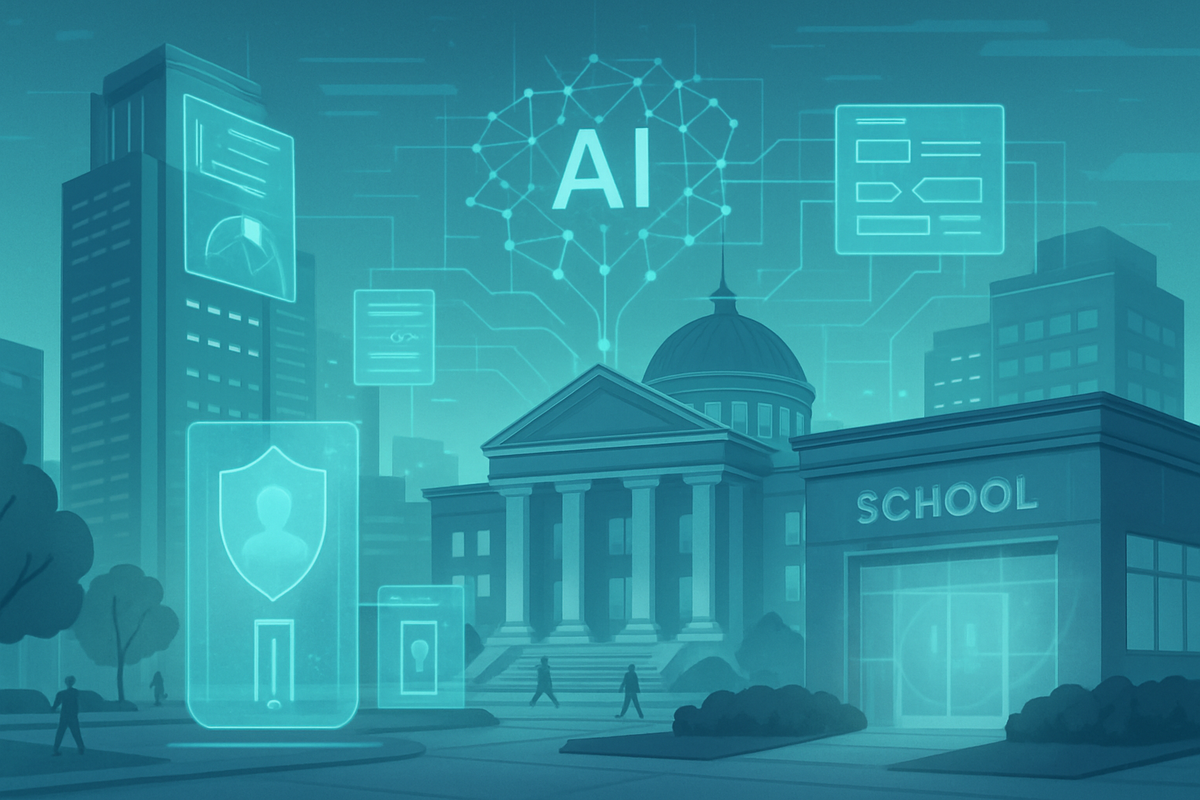Financial News
AI Revolutionizes Public Sector: From Digital Assistants to School Safety, a New Era of Government Services Emerges

The public sector is undergoing a profound transformation driven by artificial intelligence, with recent innovations spanning enhanced citizen services, streamlined government operations, and bolstered public safety. In Texas, the expansion of AI-powered digital assistant services is reshaping how citizens interact with state agencies, offering unprecedented efficiency and accessibility. Concurrently, the National Association of State Chief Information Officers (NASCIO) has lauded pioneering AI applications across various states, highlighting the technology's growing utility in legislative review, emergency response, and broad citizen engagement. Perhaps most critically, schools nationwide, exemplified by initiatives like Warrick County School Corp.'s adoption of advanced weapons detection systems, are deploying AI to safeguard students and staff, marking a significant pivot in school security strategies.
This confluence of advancements signals a new frontier in public service delivery and safety, promising more responsive, intelligent, and secure environments for citizens. While the immediate implications point towards greater efficiency and enhanced security, the widespread integration of AI also raises crucial discussions around ethical deployment, data privacy, and the evolving landscape of public trust in technology. The rapid pace of these innovations underscores a broader trend: AI is no longer a futuristic concept but a present-day imperative for modern governance.
Unpacking the Public Sector's AI Leap: Texas, NASCIO, and School Security
The push for AI integration in the public sector has manifested in several high-profile initiatives across the United States. In Texas, the state has been at the forefront of leveraging AI to modernize citizen-facing services. The Texas Department of Information Resources (DIR) launched the "Texas by Texas (TxT)" digital assistant platform in January 2022, designed as a comprehensive online portal for residents to manage state-issued licenses, registrations, and receive proactive reminders. This platform, with an anticipated continuous expansion, aims to simplify interactions with government, reducing bureaucratic hurdles and offering more personalized digital experiences. By July 2025, initiatives like "Texas ID Online: Streamlining Government Services with AI" are projected to further enhance identity verification and management through AI, while collaborations with firms like B12Gov are providing state agencies with advanced AI and automation solutions. Texas State University has also joined the fray, integrating AI tools for research and piloting generative AI programs for its community, underscoring a statewide commitment to AI adoption. As of October 2025, an advisory committee is being formed to address the ethical implications, bias, and privacy concerns associated with the state's expanding AI footprint.
Meanwhile, the National Association of State Chief Information Officers (NASCIO) continues to play a pivotal role in recognizing and fostering AI innovation within state governments. The 2025 NASCIO State IT Recognition Awards highlighted several groundbreaking AI applications. The State of Indiana was recognized for its "Ask Indiana – A Portal-wide Generative AI Chatbot," showcasing a broad implementation for citizen interaction. Minnesota received accolades for an "AI Tool Revolutionizing Legislative Review," demonstrating AI's capacity to enhance governmental operational efficiency. The State of Washington was honored for "Smart Smoke Signals: AI Vision and Data for Faster Fire Response," a critical application in public safety and emergency management. These awards, alongside the recognition of leaders like Washington state's CTO Nick Stowe in October 2024 for his AI leadership, underscore a clear trend: states are actively exploring and deploying AI to improve everything from citizen engagement to internal processes and public safety. NASCIO's advocacy priorities for 2025 further solidify the importance of expanding artificial intelligence across federal and state levels, while also emphasizing the need for robust data quality and governance frameworks.
Perhaps one of the most impactful and sensitive areas of AI deployment is in school safety. As of October 2025, schools are increasingly adopting AI-powered weapons detection technology to mitigate the persistent threat of gun violence. Companies like Eagle Eye Networks have introduced AI-enabled gun detection systems that continuously monitor existing security camera footage for visible firearms, using "Rapid Edge AI" for initial detection and larger AI models for verification to minimize false alarms. These systems, already in use at institutions like Valor School in Austin, Texas, alert trained professionals and initiate emergency protocols upon verification. Similarly, Baltimore City schools have implemented Evolv Technology's (NASDAQ: EVLV) AI scanners, which are designed to quickly identify weapons or components as individuals pass through, allowing students to keep most items in their bags while staff monitor alerts on tablets. ZeroEyes offers AI-powered gun-detection software that integrates with existing surveillance systems, with a 24-hour operations center verifying threats before alerting school administrators and law enforcement—a system credited with detecting an armed minor in a Texas elementary school. These deployments signify a proactive shift towards leveraging advanced technology for early threat detection, though concerns about accuracy, false alarms, and cost-effectiveness persist.
Corporate Fortunes in the AI Public Sector Boom
The burgeoning adoption of AI in the public sector creates a distinct landscape of winners and losers among technology companies. On the winning side are companies specializing in AI platforms, machine learning, and data analytics that can tailor their offerings to government needs. Firms like B12Gov, which collaborates with Texas agencies to provide AI and automation solutions, are poised for significant growth as states seek to modernize their operations. Similarly, companies offering comprehensive generative AI solutions, such as those recognized by NASCIO for statewide chatbots or legislative review tools, will see increased demand. Companies like Google (NASDAQ: GOOGL), Microsoft (NASDAQ: MSFT), and Amazon (NASDAQ: AMZN), with their extensive cloud AI services and government contracts, are well-positioned to capitalize on this trend by providing foundational AI infrastructure, large language models, and specialized government-focused AI solutions. Their ability to offer secure, scalable, and compliant AI platforms makes them attractive partners for public sector entities.
In the realm of public safety, Evolv Technology (NASDAQ: EVLV) stands out as a clear winner, with its AI-powered weapon detection systems gaining traction in school districts like Baltimore City. As concerns over school safety remain paramount, the demand for sophisticated, non-invasive screening technologies will likely surge, benefiting companies like Evolv. While Eagle Eye Networks and ZeroEyes are currently private, their innovative AI gun detection solutions position them strongly for future growth, potentially attracting significant investment or even public offerings as the market for AI-driven security expands. These companies provide critical early detection capabilities, offering tangible solutions to a pressing societal problem. Furthermore, cybersecurity firms that specialize in protecting AI systems and government data will also thrive, as the increased integration of AI inherently raises new cybersecurity risks.
Conversely, companies that fail to adapt their offerings to include AI or those relying on outdated, manual processes may face significant challenges. Traditional government contractors that do not invest in AI capabilities could lose out on lucrative public sector contracts. Furthermore, companies whose AI solutions prove unreliable, prone to bias, or fail to meet stringent public sector security and privacy standards could suffer reputational damage and market share loss. The public sector's emphasis on ethical AI and data governance means that transparency and accountability will be crucial. Vendors that cannot demonstrate these qualities effectively will struggle to gain trust and secure long-term partnerships. The rapid pace of AI innovation also means that companies with slower development cycles or those unable to scale their solutions efficiently may be left behind in a competitive market.
The Broader AI Horizon: Trends, Regulations, and Historical Echoes
The widespread integration of AI in public services and safety is not an isolated phenomenon but a critical component of broader industry trends. Globally, governments are recognizing AI's potential to enhance efficiency, transparency, and citizen engagement. This aligns with a macro trend towards digital transformation across all sectors, where data-driven decision-making and automation are becoming standard. The public sector's adoption of AI, particularly generative AI for chatbots and predictive analytics for public safety, reflects a maturation of the technology, moving beyond experimental phases to practical, scalable applications. This push is also fueled by a desire to optimize resource allocation and improve service delivery in an era of increasing citizen expectations and fiscal constraints.
The ripple effects of this public sector AI boom are substantial. Competitors in the technology space are now compelled to accelerate their AI development and integration efforts, understanding that government contracts represent a massive and stable market. Partners, including consulting firms, system integrators, and academic institutions, will see increased opportunities to support public sector entities in their AI journeys, from strategy and implementation to training and ethical oversight. On the regulatory front, the rapid deployment of AI is already prompting discussions and the formation of advisory committees, as seen in Texas. Governments are grappling with the need to establish clear guidelines for AI use, addressing critical issues such as data privacy, algorithmic bias, accountability, and the potential for job displacement. This could lead to new legislation or policy frameworks akin to GDPR or other data protection laws, specifically tailored for AI.
Historically, the current wave of AI adoption in government echoes past technological shifts, such as the internet revolution or the widespread implementation of enterprise resource planning (ERP) systems. Each transition brought promises of efficiency and improved services, alongside challenges related to implementation, cost, and societal impact. The key difference with AI is its pervasive nature and its capacity for continuous learning and adaptation, which introduces more complex ethical and governance considerations. While past technologies primarily automated existing processes, AI has the potential to fundamentally redefine how government operates, from policy analysis to citizen interaction. Comparing the current moment to the early days of widespread computerization in government, the stakes are arguably higher, given AI's ability to influence decisions and interact with citizens in a more autonomous fashion. The successful navigation of these challenges will determine the long-term impact and public trust in AI-powered governance.
The Path Ahead: Opportunities, Challenges, and Strategic Shifts
Looking ahead, the short-term possibilities for AI in the public sector include the continued expansion of digital assistant services, with more government agencies adopting chatbots and virtual assistants to handle routine inquiries and transactions. We can expect to see further refinement and deployment of AI-powered analytics for optimizing public services, such as traffic management, resource allocation for emergency services, and predictive maintenance for infrastructure. In schools, the immediate future will likely involve more widespread adoption of advanced security technologies, potentially integrating AI with other safety measures like access control and communication systems. The emphasis will be on demonstrating the effectiveness and reliability of these systems while addressing concerns about privacy and false positives.
In the long term, AI's role in the public sector is set to become even more pervasive and sophisticated. We could see AI assisting in policy formulation through complex data analysis, predicting societal trends, and even personalizing public services to an unprecedented degree. The concept of "smart cities" will likely evolve with AI as its backbone, managing everything from energy consumption to urban planning. This will necessitate significant strategic pivots from both government agencies and technology providers. Governments will need to invest heavily in data infrastructure, cybersecurity, and workforce training to maximize AI's potential and manage its risks. Technology companies, in turn, will need to focus on developing highly specialized, ethical, and transparent AI solutions that can meet the unique demands of public service, moving beyond generic AI applications.
Market opportunities will emerge for companies specializing in explainable AI (XAI), AI governance, and ethical AI auditing, as public trust and regulatory compliance become paramount. There will also be a growing demand for AI talent, creating opportunities in education and workforce development. However, significant challenges remain, including the high cost of initial investment, the difficulty of integrating legacy systems with new AI technologies, and the persistent issue of data quality and privacy. Potential scenarios range from a highly efficient, citizen-centric government powered by AI to a future fraught with ethical dilemmas, job displacement, and public distrust if AI is not implemented thoughtfully and responsibly. Navigating these complexities will require continuous dialogue between policymakers, technologists, and the public.
A New Dawn for Public Service: Summarizing the AI Imperative
The recent surge in public sector AI innovations, from Texas's expanded digital assistant services and NASCIO-honored applications to cutting-edge weapons detection in schools, marks a pivotal moment in governance and public safety. These developments underscore a clear and accelerating trend: AI is no longer a futuristic concept but a foundational technology reshaping how governments operate and interact with their citizens. The key takeaways are clear – AI offers unparalleled potential for enhancing efficiency, improving service accessibility, and bolstering security, but its deployment must be accompanied by robust ethical considerations, data governance, and strategic planning.
Moving forward, the market will continue to witness a significant push towards AI adoption across various government tiers. Companies like Evolv Technology (NASDAQ: EVLV), along with major cloud and AI providers such as Google (NASDAQ: GOOGL), Microsoft (NASDAQ: MSFT), and Amazon (NASDAQ: AMZN), are well-positioned to benefit from this trend, offering scalable and secure AI solutions. Conversely, firms unable to innovate or address the ethical and privacy concerns inherent in AI will face increasing pressure. The wider significance of these innovations lies in their capacity to fundamentally redefine public service delivery, setting new benchmarks for citizen expectations and operational effectiveness.
For investors, the coming months will be crucial for identifying companies that are not only developing cutting-edge AI but also demonstrating a strong commitment to ethical deployment, transparency, and compliance with emerging regulations. Watch for companies securing significant public sector contracts, those investing in specialized AI solutions for government, and firms that prioritize robust cybersecurity and data privacy in their AI offerings. The long-term impact of AI on the public sector is expected to be transformative, creating both immense opportunities and complex challenges. The journey towards an AI-powered government is just beginning, and its trajectory will be shaped by continuous innovation, thoughtful policy, and a commitment to serving the public good.
This content is intended for informational purposes only and is not financial advice
More News
View More




Recent Quotes
View More
Quotes delayed at least 20 minutes.
By accessing this page, you agree to the Privacy Policy and Terms Of Service.



